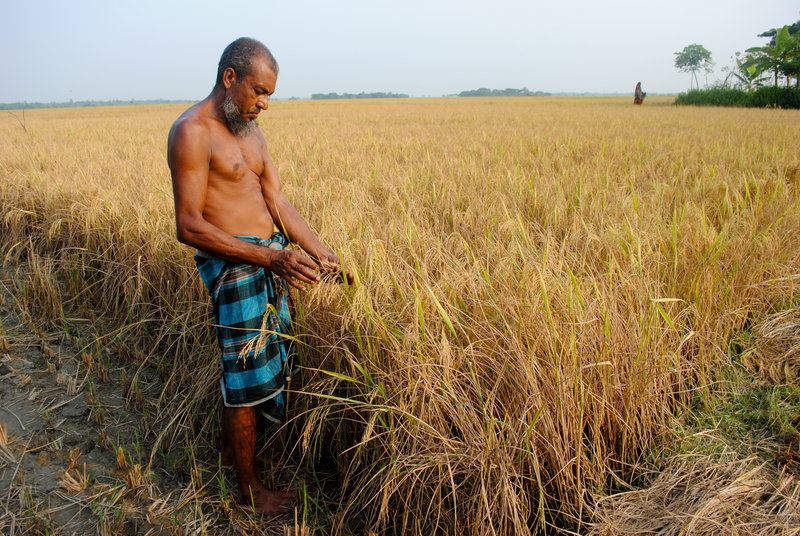With the dangers of Climate Change growing every day there seems to be more and more attention being raised towards it within the public. Sadly there are still many officials not just in our government but around the world who ignorantly are denying the facts and hard evidence that proves the reality of this potential natural disaster and the connection of human activity as a cause of it in the past decades. There have been many recent events that confirm this event such as the California drought, the melting of the polar ice caps and an increase in unusual weather patterns.
One of the global areas affected is the agriculture industry in densely populated Bangladesh.
In the village of Gholgholia, rice in one field grows unevenly. The leaves are dry and brown and there are bald patches between clumps. This is the result of salty soil which doesn’t enable farmers to persuade the rice to grow. The salty soil causes some farmers to give up and leave these fields completely plain. This puts further farm development at risk and decreases the area used for growing food.
Climate change is one of the main reasons farmland in Bangladesh is becoming increasingly salty. Especially in the coastal south, which was originally and traditionally the country’s “rice basket”. There are hundreds of thousands of acres of land that lay empty all across the country. Production of crops that are salt sensitive such as rice, potato and mustard, has decreased. The low flat coastal farm land is being threatened by gradually rising sea levels.
“A lot of land is fallow because of salinity,” said Timothy Russell, head of the Cereal Systems Initiative for South Asia, or CSISA, in Bangladesh.
Now before you get all nervous I’m happy to tell you that there is a potential solution to this specific problem.
“If you can bring in salt-tolerant rice or other salt-tolerant crops, like sunflower, you can utilize the land,” Russell says. “That’s the dream.”
This dream is slowly becoming a reality with the help of a program sponsored by three nonprofits: theInternational Rice Research Institute, the World Fish Center and the International Maize and Wheat Improvement Center. Since 2011, about 180,000 farmers have received saline-tolerant rice seeds and have been training on how to grow them. Scientists at the Bangladesh Rice Research Institute created the new varieties by crossbreeding rice varieties that were already naturally resistant to salty soil. So they’re not genetically modified plants.
With Bangladesh being the world’s sixth-largest rice producer and rice accounting for 70 percent of calories consumed by its population of 160 million, It’s good to see there are efforts being made to protect the agriculture scene.
Din Mohammed, a 42-year-old farmer, estimated his rice yield dropped by a third because of the increased salinity after the storm (Cyclone Aila) that broke out near embankments and flooded the village’s valuable farmland with salty water back in 2009. But according to Din, the new variety offers more rice. Alongside the new variety of rice, Mohammed has also started planting sunflowers in the same field after he harvests the rice. Because sunflowers naturally are much more tolerable to salty conditions. Around 800 farmers have also started growing sunflowers that can be turned into cooking oil through a pilot program. So far this program has been showing great promise. Within only a few months, these sunflowers would reach up to 4 feet tall and paint a new landscape of lively yellow instead of uncultivated brown soil.
The truth is that Climate Change is a dangerous event that is happening whether we like it or not and we humans are one of the main reasons that such an event has accelerated dramatically within the past century. This event not only threatens the mother Earth but it also is a hazard to our Life and Property.
If the officials and industries who have promised change in policies regarding CO2 emissions do not keep it, they’re directly breaking the democratic value of Promise Keeping, they’re also putting their own lives and the lives of our future generations in danger.



VMU • Jun 5, 2015 at 1:42 pm
Human will not do anything to change this climate. Humans will just look for another way to survive instead of work hard and change the planet. Humans are the worst specie on Earth.